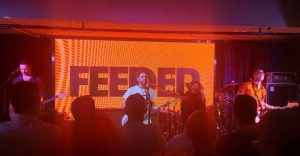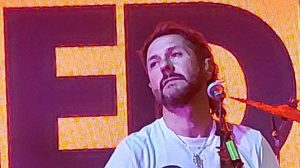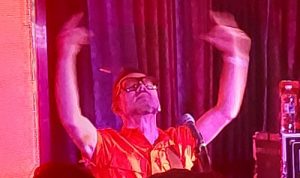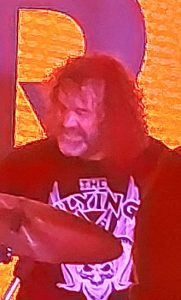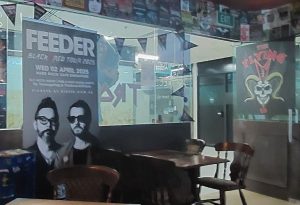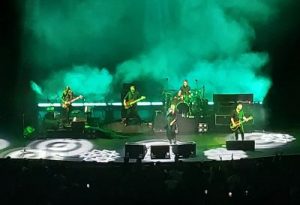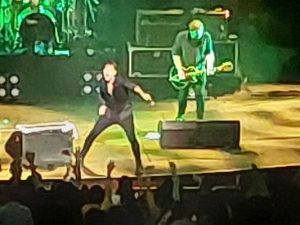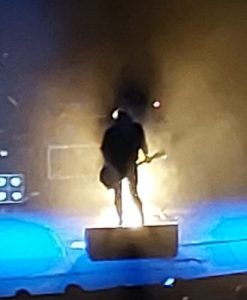
From wikipedia.org / © Will Fresch
I’ve just Googled ‘the universe’s smallest sub-atomic particle’ and been told that, from what we currently know, the title belongs to those classes of particles known as quarks and leptons. So, let me say that even a quark, or a lepton, is considerably bigger than the amount of enthusiasm I can summon about the news that legendary 1990s rock band Oasis have reformed and will embark on a five-city / 17-gig tour of Wales, England, Scotland and Ireland in the summer of 2025. (The tour has already sold out, which suggests some folk are more enthusiastic about the reunion than I am.)
Oasis have not been a thing since 2009, when the arguing, quarrelling, sniping and feuding that’d always featured in the relationship between the band’s two mainstays, Mancunian siblings Noel and Liam Gallagher, finally went supernova – as opposed to going Champagne Supernova – resulting in the band’s break-up and the pair not sharing a stage or studio since. From 2009 until recently, they’ve only acknowledged each other’s existence by flinging insults. Liam, the younger and less cerebral Gallagher, has frequently called his older brother a ‘potato’ and referred to his post-Oasis band the High Flying Birds as the ‘High Flying Smurfs’. Noel, meanwhile, has memorably described his little brother as “a man with a fork in a world of soup.”
Oasis first appeared on my radar in the mid-1990s, when I was working at Hokkai-Gakuen University in Sapporo, capital of the northern Japanese island of Hokkaido. A student approached me one day and inquired if I was ‘Bra’ or ‘O-aaa-sis’. (No, I’m not trying to indulge in Sofia Coppola-style mockery of how Japanese people speak English – I’m simply describing how the student, with her pronunciation, sounded to me at the time. I’m sure my Japanese sounded even weirder to her.) I realised she wasn’t referring to a lady’s undergarment but to British rock / pop band Blur. She was also talking about Oasis, with whom – if the British press was to be believed at the time – Blur were locked in the bitterest and most vitriolic rivalry since the Hatfields and the McCoys. (Noel Gallagher once remarked, “I wish Blur were dead, John Lennon was alive and the Beatles would reform.”) Not very familiar with either band – there was no Internet in those days and it was much harder to keep up with events in the UK – I visited Sapporo’s Tower Records soon after and bought a couple of their albums.
How would I answer that student? Was I Blur or Oasis?

© Creation Records
The Oasis album I bought was 1994’s Definitely Maybe and by my reckoning it’s a very good record. It’s not particularly innovative, with the ghosts of the Beatles, T-Rex and Slade never far away, but it has several memorable toe-tappers and stompers like Columbia and Supersonic and one genuinely great track, Live Forever. The latter made me think that if I was a teenager, I could seriously fall in love with these guys. The song encapsulates those feelings of hope and optimism you have in your teens, no matter how humble or ordinary your origins, about your whole life being ahead of you and great things possibly awaiting – no more so than when the refrain kicks in near the end, “Gonna live forever!”
The songs of rock’s previous big thing, the Seattle-centred grunge movement, had been introspective, melancholic, downright miserable at times, and on April 5th, 1994, less than five months before Definitely Maybe’s release, its biggest star Kurt Cobain had blown his brains out. So, in Britain at least, young music fans must have been ready for something more joyous.
Hope was also in the air politically. After a decade-and-a-half of Britain being ruled by the Conservative party – peachy for anyone living in booming, investment-heavy south-east England, crap for anyone living in the now-post-industrial rest of the country – and with the current Tory government of John Major looking clueless, a brighter future seemed to be on the cards. The Labour Party was reinventing itself as ‘New Labour’ and, mindful of the prevailing Zeitgeist, its shiny, photogenic young leader was keen to rub shoulders with Oasis, Blur and other representatives of the country’s burgeoning new rock scene that’d become known as ‘Britpop’. That smiley, nice-seeming Prime Minister-in-waiting was called Tony Blair… Well, okay. We know how that worked out.

From wikipedia.org / © Raph_PH
I also acquired Blur’s Parklife (1994) and liked it less. If Oasis drew on the Beatles for inspiration, then the spark for Parklife-era Blur was another 1960s British band, the Kinks. This resulted in a number of chirpy, quirky songs that I found irritating and made me agree with Noel Gallagher, who slagged them off as ‘chimney-sweep music’. That said, the title song (‘Shite–life’ as Liam once dubbed it), which has actor Phil Daniels babbling non-stop while singer Damon Albarn shouts “Parklife!” every so often, has been stuck in my head ever since. Even today, when I find myself in a work-meeting with a superior who drones on endlessly, their voice dripping with meaningless corporate jargon, I have to fight off the urge to shout “Parklife!” at half-minute intervals.
Anyhow, though I regarded Blur’s album as the weaker one, I still liked them. This was because I could remember seeing them live – at London’s Brixton Academy back in 1992, when hardly anyone had heard of them, on a bill that also included the Jesus and Mary Chain, My Bloody Valentine and Dinosaur Jr. I thought they’d been all right.
So, during the Blur vs. Oasis wars, I ended up neutral.
The 1990s continued. So did Oasis, Blur and the Britpop craze, which spawned dozens of bands I only have vague memories of now: Cast, Kula Shakur, Ocean Colour Scene, Heavy Stereo, Sleeper, Echobelly, Dodgy, Menswear, Mansun… Actually, I’ll admit to having a strange fondness for Mansun’s song Take It Easy Chicken.

© Creation Records
In 1995 Oasis unveiled their second album, (What’s the Story) Morning Glory?, which went on to sell 22 million copies worldwide and became one of the decade’s most acclaimed records. I wasn’t impressed, though. The opening number (and first single) Roll with It seemed shockingly generic to me – no wonder Damon Albarn nicknamed them ‘Oasis Quo’ – and it also spawned one of the world’s worst jokes: “Why did Oasis choose soup on the menu? Because they got a roll with it.” Some people adore the anthemic Don’t Look Back in Anger and Champagne Supernova but I’ve always found them overwrought. And while initially I thought the ballad Wonderwall was quite nice, I got sick of it after hearing it for the 10,000th time. (My partner and I were in a restaurant a fortnight ago when, from a speaker, Liam started intoning, “Today is gonna be the day…” We groaned and rolled our eyes.)
(What’s the Story) Morning Glory?’s huge, if in my opinion undeserved, success meant Oasis became even more of a rock-and-roll behemoth, doing all the customary rock-and-roll things. Cocaine-fuelled excess? Check. Infighting? Check. Disappearing drummers? Check. Hanging out with Johnny Depp? Check. Marrying Patsy Kensit? Check. With so much going on, it was inevitable that the band’s third album, 1997’s Be Here Now, would (a) be presaged with more, over-the-top hype than ever and (b) prove a bloated disappointment whose sales were only a third of those of its predecessor. It brought the band’s ascendancy to an abrupt end and helped pop the bubble of Britpop itself. Afterwards, Oasis made more albums and I think I’ve heard most of them. But I can’t remember a single song off them.

© Creation Records
The band’s boorish, obnoxious image put me off them too. And when people criticise Oasis for boorishness and obnoxiousness, it’s basically Liam they’re complaining about. While some of the abuse he’s doled out raises a smile – grumbling, for instance, that Florence Welch from Florence and the Machine “sounds like someone’s stood on her f**king foot” – there’s other stuff he’s said and done that just makes him seem like an arsehole. An incident at Q magazine’s awards ceremony in 2000 where he heckled Kylie Minogue by yelling ‘lesbian!’ at her is also a reminder that, over the years, a fair amount of homophobia has issued from the younger Gallagher’s gob.
Yet, despite this, many journalists and critics have given Liam an easy ride – even when they’ve been on the receiving end of his loutishness. One possible reason why is the belief that because he comes from an ‘authentic’ working-class background in Manchester, Liam is somehow the ‘authentic’ voice of the working class. Therefore, if you criticise his antics, you’re being ‘class-ist’. Indeed, this argument has re-ignited in the wake of the news about 2025’s reunion tour. The British media is suddenly full of commentators accusing other commentators, ones not delighted by Oasis’s return, of being snobbish and anti-working class.
But I don’t think any of this holds water. For one thing, I’ve known working-class people who’ve also been unimpressed by Liam’s yobbishness. And, in my time, I’ve seen plenty of middle-class and upper-class people make knobheads of themselves, and their social status didn’t make me think they were any less arseholey than the Oasis frontman.

From wikipedia.org / © Alexander Frick
Tellingly, Mark Lanegan – singer with 1990s grunge band the Screaming Trees and somebody whose upbringing in Ellensburg, Washington, sounds much tougher than the Gallaghers’ in Manchester – didn’t have a high opinion of Gallagher the Younger. In his 2020 autobiography Sing Backwards and Weep, Lanegan recalls how in 1996 the Screaming Trees supported Oasis during a North American tour. At the tour’s start, Liam accosted Lanegan with a mocking cry of “Howling Branches!” – Howling Branches, Screaming Trees, get it? Lanegan described his response thus: “‘F**k off, you stupid f**king idiot’ was my brief blasé retort, spoken as if to a bothersome mosquito.”
This was not the beginning of a beautiful friendship. Lanegan came to detest Liam so much that he wrote: “I couldn’t believe someone hadn’t beaten, knifed, or shot him to death by now, such was the reckless, witless, and despotic nature of his insufferable façade.”
So, I wasn’t subject to even a fleeting moment of temptation to spend hours in a Ticketmaster queue and shell out eye-watering sums of money to see Oasis perform next summer. As far as I’m concerned, the band have only one really decent album behind them. Besides, I’m not sure they’ll even make it through the tour. Noel may well bail out before the end, deciding that occupying the same airspace as his tosser-ish brother again is more than his sanity is worth.

© Food Records / Virgin Records
Finally, returning to the old Blur-Oasis rivalry, I have to say I’m now in the Blur camp. I think they’re the better band because, in the end, they’ve produced more good songs that Oasis have: This is a Low (1994), He Thought of Cars, The Universal (both 1995), Beetlebum, Song 2, Death of a Party (all 1997), Coffee & TV (1999), Out of Time (2003)… Incidentally, given that Oasis were always supposed to be hard-men northerners while Blur were poncy, studenty southerners, the video for The Universal, inspired by Stanley Kubrick’s A Clockwork Orange (1971), makes Blur look far more disturbing than their Mancunian adversaries ever looked. Damon Albarn and co. make great Droogs.
But if I had to choose one band that represented the peak of Britpop, it wouldn’t be Blur or Oasis. No, it’d be Sheffield’s Pulp, led by the sublimely sly Jarvis Cocker. Pulp’s Common People (1995), for instance, brilliantly captures one of the indignities of being working class – that of having moneyed people trying to ‘slum it’ by hanging out with you in order to look cool. No wonder that in 2004 Common People received the ultimate accolade – William Shatner sang a cover version of it. I can’t imagine the former Captain Kirk ever wanting to wrap his tonsils around Wonderwall.

© Island Records
